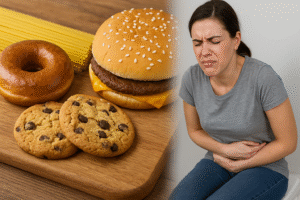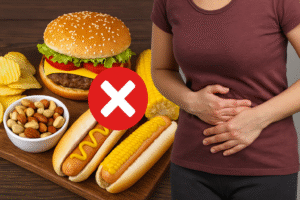Pregnancy is definitely an exciting period in a woman’s life filled with joy, anticipation, and of course many changes – especially in terms of what you get to eat. If you are pregnant, no doubt you will have people telling you what you should and shouldn’t be eating. What is the real truth? Which foods do you actually stay away from to keep yourself and your baby healthy?
Let us list the top foods to avoid during pregnancy so we can explain later why it is absolutely essential to be so particular with your diet over these next nine months. Don’t worry – we’ll keep it simple, conversational, and memorable!
There are certain foods that should be off-limits to expectant mothers. All the same, the pregnancy period can be a bit immune-weakening condition, and taking the wrong foods may expose the baby to high infection or complication risks. It’s possible that some foods host bacteria, parasites, or chemicals with noxious effects, though not necessarily at other times.
What are these to be careful of?
1. Raw or Lightly Cooked Seafood
Sushi lovers, we have some bad news: foods such as raw oysters, clams, and sushi itself may contain harmful bacteria and parasites like listeria and salmonella, which in actual real sense causes pregnancy complications and food poisoning. Better option: If you’re really craving seafood, eat only fully-cooked fish like salmon or tilapia.
Just make sure it’s well done!
Raw fish will:
– Expose you to harmful bacteria
– Increase the risk of miscarriage or cause birth defects
2. Deli Meats and Cold Cuts
The turkey sandwich may appear very innocent, but the cold deli meats may be infected with listeria bacteria. These bacteria then cross through the placenta bringing very serious related problems that may at times culminate in premature deliveries or even stillbirth.
Instead: If you have to eat a sandwich made of cold cuts, heat the meat until it is steaming hot. It’s not so much work for so much pay off!
3. Unpasteurized Milk and Cheese
Soft cheeses such as Brie, Camembert, or Mexican cheeses made with unpasteurized milk can pose a hazard. Unpasteurized products may be contaminated with dangerous bacteria, including but not limited to listeria.
Choose from the hard ones: cheddar, Swiss; or choose the soft ones if only ‘made with pasteurized milk’ is distinctly marked.
4. High-Mercury Fish (Such as Shark and Swordfish)
Fish generally is one of the good choices during pregnancy because it is loaded with omega-3 fatty acids. However, some large fish can be high in mercury that can harm the developing brain and nervous system of your baby. The higher the mercury value, the more fish you should avoid. Now, some of the high mercury fish include:
– Shark
– King mackerel
– Tilefish
– Bigeye tuna
Healthier picks include salmon, and then good old favorites cod and haddock, as well as canned light tuna (moderately).
5. Raw or Undercooked Eggs
One of the most usual places for sneaky sources of salmonella is unwashed fruits and vegetables.
Shortly after:
Original: It may be tempting to lick the spoon while baking cookies, but raw eggs can harbor salmonella, causing a food-borne illness. Watch for sneaky sources such as homemade mayonnaise, Caesar salad dressing, or raw cookie dough.
You can pasteurized eggs or egg substitutes instead.
6. Unwashed Fruits and Vegetables
One of the sneakiest sources of salmonella is probably kept by unwashed fruits and vegetables.
Fruits and vegetables are very important during pregnancy. But if they have not been washed properly, they may be carrying toxoplasma, a parasite that lives in soil and dirty water, which is very dangerous for your baby. Quick fix: Wash produce well under running water before consuming, peeling, or cooking it—even though it may look clean.
7. Excessive Caffeine
Yes, you can have your brief morning coffee ritual, though in moderation. Excessive caffeine may raise the chances of miscarriage or the baby being underweight. How much is ‘moderation’ after all? Well, experts advise an intake of less than 200 milligrams of coffee a day.
8. Alcohol
This one’s a biggie and we all ought to know. Drinking alcohol during pregnancy can cause fetal alcohol syndrome, which has life-long effects on a child’s development. Sadly, no “safe amount” has been identified so it’s better to go cold turkey.
9. Raw Sprouts
Alfalfa, clover, mung bean, and radish sprouts can get contaminated with E. coli or salmonella bacteria when consumed in their raw form. If you’re a fan of sprouts, make sure they’re thoroughly cooked before mixing them into your food.
10. Liver and Liver Products
From liver and liver products, prenatal mothers get abundant iron and vitamin A. The nutrition from animal sources is particularly harmful owing to exaggerated amounts of vitamin A (retinol) that could damage the development of your baby.
Better choices for Iron: Meat has good portions of iron, however it’s better to get your iron from sources such as lean meats, legumes and salad greens during the gestation period.
11. Junk foods
Pregnant women do experience cravings in reality, but it is well known that excessive consumption of sugary, greasy, or junk food during pregnancy can tip the risk for gestational diabetes, excessive weight gain during pregnancy, and overall unfavorable long-term health for your child.
Tip: Keep it balanced. Have your ‘cheat meal’ once in a while but keep the major portion of your meals filled with clean, whole foods like fruits, vegetables, whole grains, and lean proteins.
Pregnancy doesn’t mean giving up everything you love to eat. Just make a few smart swaps and be a little cautious. After all, each bite fuels the growth and development of your little one. Of course, before making any changes to your diet, always consult your doctor or midwife. They are going to be your best friend throughout this whirlwind experience. So the next time you find yourself standing in front of your refrigerator questioning what’s safe to eat, here are the facts: when in doubt, cooked is better than raw, whole is better than processed, and fresh trumps doubtful every time. Your baby and your body will appreciate it!
Are there any food swaps or tricks you’ve figured out during pregnancy in being better prepared and organized for the process? Please share your experiences in the comments – we would love to hear from you!








